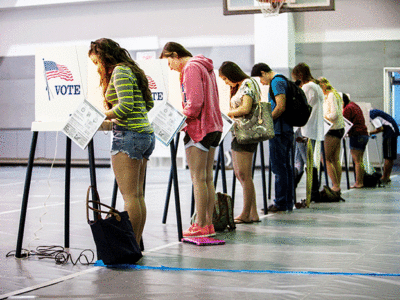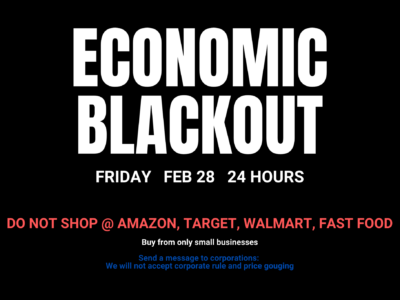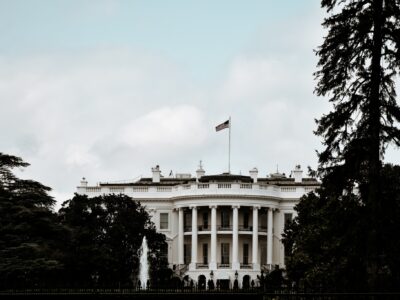I’m a 21-year-old political science major about to vote in my first presidential election. Getting to vote makes me excited and feel mature; it’s a reminder that my view on something has just as much weight and political significance as every other citizen in this country.
But as the election unfolds, an air has set in that makes its circumstances–and its implications–more drastic and chaotic than usual. Both major parties have demonstrated major rifts within themselves. Terrorism headlines the international agenda more; American race relations still aren’t perfectly sound; And, while one would expect a strong sense of passion to accompany the impending voting decision for my preferred candidate, something is missing: I can’t seem to pinpoint what or who I’m voting for, only that I don’t want the other side to win.
At face value this statement may not seem detrimental. I would assume all voting habits could, in part, consist of distaste for the opposing view. But when diving further, there may be an issue here. My primary rationale for why my candidate should be in office is that I find qualities of the opponent significantly worse. And I’m not the only one. Apparently, Clinton and Trump had the highest general unfavorability rating of any two running candidates in the past 10 presidential cycles. What’s worse? Neither are that favored among their own party. This didn’t surprise to me. The all-too-frequent news headlines about Clinton’s hidden agenda or Trump’s blatant disregard for anyone but Trump seem to speak for themselves.
While one may expect this collective negativity to lead to decreased participation, the opposite takes the lead. General election turnout still shows signs of matching and surpassing 2008’s record year. A high number of voters still go to the polls but this time motivated by prevention, not activism. People aren’t voting to support the strongest knight in shining armor. They’re voting to prevent the knight who has shittier crest colors from entering the ring.
In a time of immense social divide and movements like Black Lives Matter, LGBTQ rights, immigration reform and ISIS, people show support for the candidate that will do the least harm to their existing interpretation of the status quo. As if our divided government’s inability to pass a bipartisan bill wasn’t enough, we Americans seem to once again be adding fuel to the massive, boiling fire pit of polarization on Capitol Hill by trying to push the other side out.
Reminding myself that I too have been one of the serfs keeping us stuck in the Stone Age, I reached out to others within my demographic–you know, handsome, fit, intelligent young college students–to see if someone could provide logical rationale for my anti-opposition voting strategy. President of University of Michigan Democrats Collin Kelly felt that regardless of your motive, participation in an election is valuable and important. “Even if people pick the lesser of two evils, I think they have a responsibility to do so. I think voting third party or not voting is dangerous if you know someone doesn’t represent your values at all,” Kelly said. “I think you have an obligation to use your vote to prevent the greater evil so that people’s lives will actually be affected by it.”
He continued by using the Sanders supporters backing Clinton as an example. “A lot of Sanders supporters still vote against Trump because they believe in a lot of the stuff Clinton has said, but not her as a person. I think there are two very important distinctions: values and people as individuals sometime don’t always go hand in hand.” So, while we lowly townsfolk maybe didn’t get our number one choice in the jousting match, our love for our ruling political castle overpowers all, especially when picking the next leader of our nation.
However, there’s a different story for the Republicans. An immense amount of gladiators jockeying for survival led the GOP to create a wide spectrum of interests and viewpoints in competition, drastically spreading out the voting base and making castle-first unification seem less likely. And Trump’s belief that everything he touches turns to gold has only garnered a large of amount of distaste within his own constituency. “The most people ever in the Republican primary voted for Trump, but also the most people voted against him in history. He actually has a record low percentage of the total primary votes to go on and become the nominee,” President of the Harvard Republican Club Declan Garvey said. Garvey also said that the small amount of those within the club, who officially denounced Trump as the GOP candidate earlier this month, still sided with the Republican primary winner. “Even the people that I do know who are supporting Trump–which is a very small number in our age group–are voting more as an anti-Hillary vote than a Trump vote.”
Garvey quickly noted the importance of political participation too; Even if participation is drawn from a sense of protest towards the opposing side, your own or for a third party. “We have the lowest voter turnout rate in the world among established democracies,” he said. “I think that higher voter turnout is key to getting on the same page in the process.” While some college Republicans seem to take a seat in the active voter Viking boat, their rationale for doing so differs from the left, preferring to possibly make a statement of frustration at their own leadership rather than working to make immediate change.
Regardless, it’s clear the kingdom is in a state of transition. We citizens made up of average farmhands, caretakers, merchants and jesters are pissed off. We point fingers and can only agree that the grass lining the pastures of the enemy is definitely not green. Hearing from both sides, despite their differing circumstances, beliefs and candidates, opened an interesting discussion. A discussion centered on the importance of participation–maybe to make a point, maybe to make a change. If this is the truth, then it looks like we are in fact heading in the right direction–even if it isn’t for the initial reason you might expect. But can anyone argue that just standing around makes a change?



















